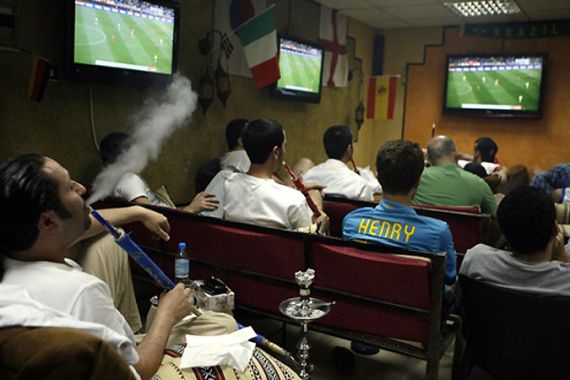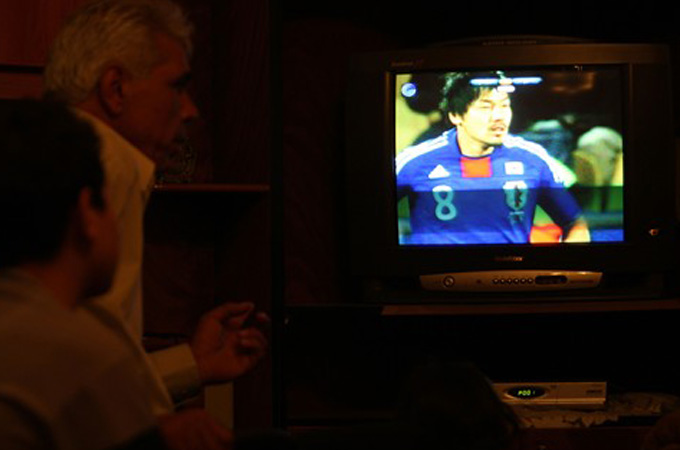Jordan rejects TV jamming charge
Ministry of Information in Amman denies that Jordan was behind disrupting Al Jazeera’s 2010 World Cup broadcast signals.

 |
| Signal interruptions frustrated millions of viewers across the Middle East and North Africa [AFP] |
The Jordanian government has officially denied that the jamming of Al Jazeera’s broadcast of the 2010 World Cup happened from its territory.
In a written statement to Al Jazeera on Wednesday, the Jordanian minister for information “categorically rejects” the allegations that Jordan was behind disrupting the signal.
The statement followed a report in the UK-daily Guardian alleging that “secret documents” prove that Jordan deliberately jammed Al Jazeera’s broadcast of the World Cup games in South Africa.
The signal interruptions frustrated millions of viewers across the Middle East and North Africa, who had to deal with pixelated, fuzzy images, blank screens and game commentary in wrong languages.
The Guardian reported that the jamming was “unlikely to have been done without the knowledge of the Jordanian authorities” and pointed to Jordanian animosity toward Al Jazeera as the reason behind the interference.
Jordan’s statement
“I would like first of all to assert that the government categorically rejects all such allegations,” the statement read, adding that “since Jordan’s government is keen on dealing with this issue in the most co-operative and transparent sense, it is asking you (Al Jazeera) to provide her with all reports and evidence that you claim to have, as soon as possible, so as to be studied, scrutinised and reviewed in line with its principles and to be able to decide on the actions to follow.”
Besides denying the accusations, the Jordanian government also said that it “will preserve its full right in taking any actions/measurements that it will see necessary to protect the Kingdom’s interests and secure its rights and legally sue all corporations or individuals who undermine its reputation and image.”
Salameh Nematt, a Jordanian communication consultant, told Al Jazeera that the denial by his government is “not very convincing”.
“How would anybody know that there was such disruption of the Al Jazeera signal. At the same time, the accusations also raises questions as to why it took three months before Al Jazeera came up with these allegations,” he said.
Interference located
An American firm, Integral Systems, has helped Al Jazeera pinpoint the location of interference.
In a press statement on Tuesday the Maryland based company said: “Al Jazeera needed the most comprehensive satellite interference detection and geolocation system that could quickly, easily and accurately identify and locate the interference.”
The statement said that experts “quickly detected and characterised the interference, and identified the interferer’s location with an extremely high level of accuracy – within as little as 2-3 kilometres”.
Saeed Bawazir, director of technology at Al Jazeera TV, acknowledged Integral Systems’ crucial role in detecting the location of the jamming signal.
“Integral Systems’ interference, detection and geolocation capabilities and support were instrumental in identifying the satellite interference issue that impacted millions of our viewers (and) helped us locate the jammer that had severely impacted our business during the Fifa World Cup,” Bawazir said.
The US firm’s announcement came as Fifa issued a statement condemning the alleged interference in Al Jazeera Sports’ World Cup telecast.
“Fifa condemns any interference of authorised transmissions of its competitions and hopes the relevant stakeholders will solve the issue,” Fifa’s media department said in a statement on Tuesday.
“We are appalled that such interference happened during the 2010 FIFA World Cup South Africa as it denied football fans in the region the chance to follow the world game live”.
Collapsed deal
At the heart of the signal jamming incident is a deal between Al Jazeera and the Jordanian government, which failed just days before the June games.
“Four days before the kick off of the matches, Al Jazeera made an offer, demanding $8m for the broadcast rights of 20 games of its choosing, and over $50,000 for the broadcast on each screen that would have been placed in underprivileged areas,” and anonymous Jordanian official told AFP.
He said the Jordanian government declined the offer due to the cost.